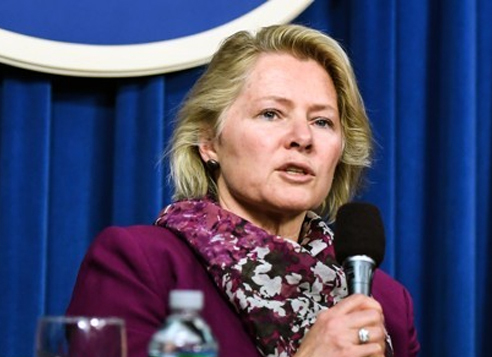President Donald Trump's policy on North Korea is different from that of his predecessor, Barack Obama, mainly in the point that the current administration is taking on the problem as the No. 1 national security priority, a senior official said Thursday.
Susan Thornton, acting assistant secretary of state for East Asian and Pacific affairs, made the remark during a think tank discussion, a day after the administration unveiled its North Korea policy centering on increasing pressure on Pyongyang while remaining open to dialogue.
 |
Acting Assistant Secretary of State Susan Thornton (Xinhua-Yonhap) |
The strategy appears little different from Obama's policy, known as "strategic patience," which centered on waiting for Pyongyang to show good faith and return to denuclearization talks while increasing sanctions and pressure on the regime.
Asked what's different from the Obama policy, Thornton said it's a matter of "timing, priority, urgency and amount of resources we're throwing behind the effort."
"The administration has made clear this is the number one national security priority for the administration and they are putting a lot of effort into getting an international coalition and sort of using all tools to the maximum effect in a short period of time to really create a burst of pressure so that we can sort of test this hypothesis: is there pressure that we can bring to bear that's going to change the calculus?" Thornton said.
"Is it different from the Obama administration's policy? I think it is in the sense that it's the number one security challenge that we're facing right now, according to the administration and the president. We will be pursuing it in that vein," she said during a Foundation for Defense of Democracies Discussion.
What stands out from the new policy is the emphasis on the need for dialogue with the North as well as the lack of any mention or suggestion of the possibility of military action, such as the phrase "all options are on the table."
That's considered a big change for the tough-talking Trump administration. Last month, Secretary of State Rex Tillerson effectively ruled out any diplomatic initiative, saying two decades of diplomatic efforts to disarm the North have failed, and there was no point in pursuing the diplomatic path any longer.
Thornton said China is key to pressuring the North.
The US is trying to press Beijing to more strictly implement sanctions on the North while monitoring whether China is taking action against companies breaching sanctions. Unless Beijing takes action against such firms, the US will, she said.
The diplomat also confirmed that a US THAAD missile defense battery being installed in South Korea will become operational "within the next few days."
"We believe that this THAAD system is absolutely necessary to the defense of South Korea. Certainly, with the barrage of missile launches that we've seen from North Korea over the last year, it's very difficult to make an argument that the South Koreans should not have this kind of defensive system," she said.
"I think China and Russia, while they may believe that this system is somehow aimed at something other than the defense of South Korea from North Korean missiles, it's just not true," she added. (Yonhap)







![[Today’s K-pop] Blackpink’s Jennie, Lisa invited to Coachella as solo acts](http://res.heraldm.com/phpwas/restmb_idxmake.php?idx=644&simg=/content/image/2024/11/21/20241121050099_0.jpg)
